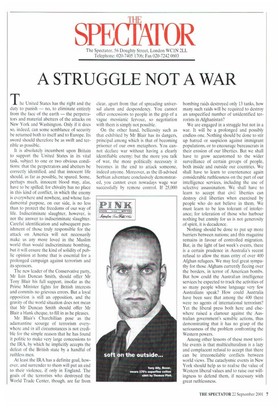A STRUGGLE NOT A WAR
The United States has the right and the duty to punish — no, to eliminate entirely from the face of the earth — the perpetrators and material abetters of the attacks on New York and Washington. Only if it does so, indeed, can some semblance of security be returned both to itself and to Europe. Its sword should therefore be as swift and terrible as possible.
It is absolutely incumbent upon Britain to support the United States in its vital task, subject to one or two obvious conditions: that the perpetrators and abetters be correctly identified, and that innocent life should, as far as possible, be spared. Some, perhaps much, innocent blood may, alas, have to be spilled; for chivalry has no place in this kind of conflict, in which the enemy is everywhere and nowhere, and whose fundamental purpose, on our side, is no less than to protect the freedoms of our way of life. Indiscriminate slaughter, however, is not the answer to indiscriminate slaughter. Careful identification and subsequent punishment of those truly responsible for the attack on America will not necessarily make us any more loved in the Muslim world than would indiscriminate bombing, but it will ensure the kind of solidity of public opinion at home that is essential for a prolonged campaign against terrorism and its sponsors.
The new leader of the Conservative party, Mr lain Duncan Smith, should offer Mr Tony Blair his full support, insofar as the Prime Minister fights for British interests and commits no grievous errors, But a loyal opposition is still an opposition, and the gravity of the world situation does not mean that Mr Duncan Smith should offer Mr Blair a blank cheque, to fill in as he pleases.
Mr Blair's Churchillian pose as the adamantine scourge of terrorism everywhere and in all circumstances is not credible for the simple reason that he has found it politic to make very large concessions to the IRA, by which he implicitly accepts the defeat of the British state by a handful of ruthless men.
At least the IRA has a definite goal, however, and surrender to them will put an end to their violence, if only in England. The goals of the terrorists who destroyed the World Trade Center, though, are far from clear, apart from that of spreading universal alarm and despondency. You cannot offer concessions to people in the grip of a vague messianic fervour, so negotiation with them is simply not possible.
On the other hand, bellicosity such as that exhibited by Mr Blair has its dangers, principal among which is that of becoming prisoner of our own metaphors. You cannot declare war without having a clearly identifiable enemy; but the more you talk of war, the more politically necessary it becomes in the end to attack someone, indeed anyone. Moreover, as the ill-advised Serbian adventure conclusively demonstrated, you cannot even nowadays wage war successfully by remote control. If 25,000 bombing raids destroyed only 13 tanks, how many such raids will be required to destroy an unspecified number of unidentified terrorists in Afghanistan?
We are engaged in a struggle but not in a war. It will be a prolonged and possibly endless one. Nothing should be done to stir up hatred or suspicion against immigrant populations, or to encourage bureaucrats in their erosion of our liberties. But we shall have to grow accustomed to the wider surveillance of certain groups of people, both inside and outside our countries. We shall have to learn to countenance again considerable ruthlessness on the part of our intelligence services, including the use of selective assassination. We shall have to learn to accept that civil liberties can destroy civil liberties when exercised by people who do not believe in them. We must learn to be less tolerant of intolerance; for toleration of those who harbour nothing but enmity for us is not generosity of spirit, it is decadence.
Nothing should be done to put up more barriers between nations; and this magazine remains in favour of controlled migration. But, in the light of last week's events, there is a certain prudence in Australia's recent refusal to allow the mass entry of over 400 Afghan refugees. We may feel great sympathy for those Afghans currently fleeing over the borders, in terror of American bombs. But how could the Australian intelligence services be expected to track the activities of so many people whose language very few Australians speak? How could Australia have been sure that among the 400 there were no agents of international terrorism? Yet the liberal press both here and elsewhere raised a clamour against the Australian government's sensible actions, thus demonstrating that it has no grasp of the seriousness of the problem confronting the Western powers.
Among other lessons of these most terrible events is that multiculturalism is a lazy and complacent refusal to accept that there can be irreconcilable conflicts between world views, The cataclysmic events in New York should help us to realise the value of Western liberal values and to raise our willingness to defend them, if necessary with great ruthlessness.










































































 Previous page
Previous page